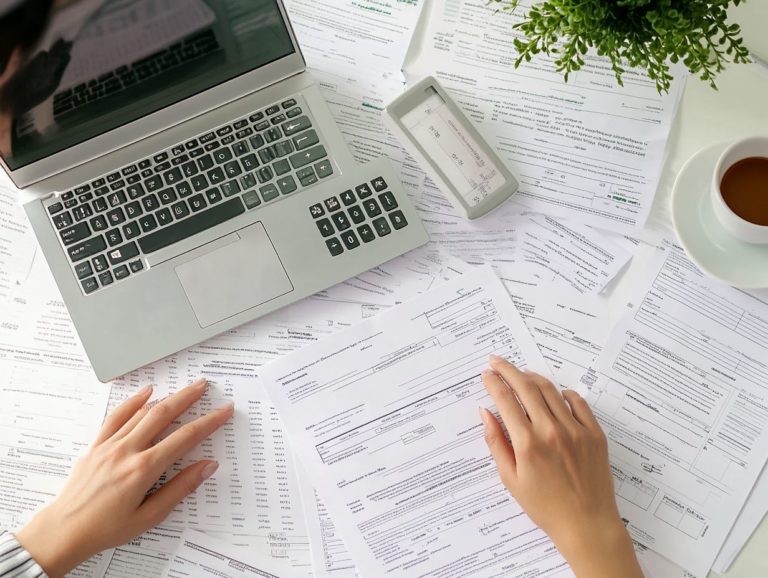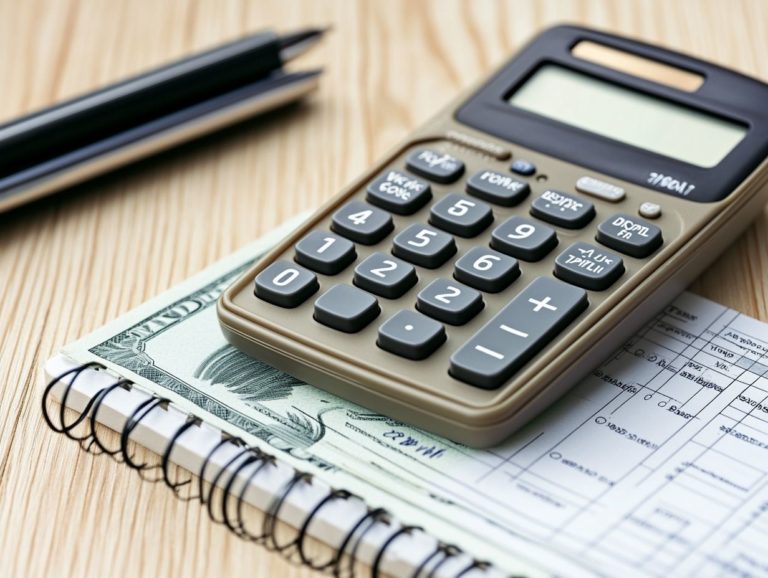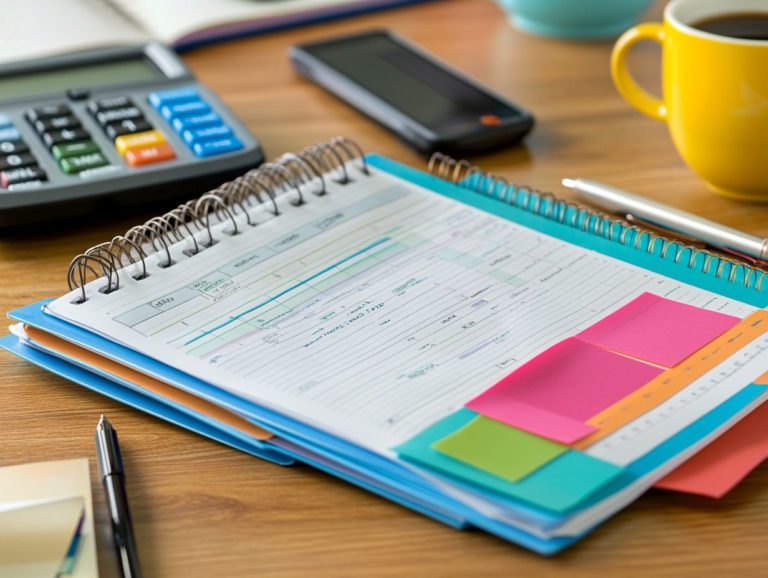What is the Freelancer’s Guide to Paying Off Debt?
Freelancing offers flexibility and freedom, but it also presents unique financial challenges, particularly regarding debt management. For many freelancers, unpaid bills and accumulating loans can create a significant burden that impacts both personal and professional growth.
This guide is your key to mastering debt as a freelancer! It highlights the importance of paying off debt and provides practical steps to help you set a budget, increase your income, and control your expenses.
You will also find advice on how to prevent future debt by establishing a strong financial foundation.
Contents
- Key Takeaways:
- The Importance of Paying Off Debt as a Freelancer
- Steps to Paying Off Debt as a Freelancer
- Strategies for Managing Debt as a Freelancer
- Preventing Future Debt as a Freelancer
- Frequently Asked Questions
- What is the Freelancer’s Guide to Paying Off Debt?
- Why is it important for freelancers to have a guide for paying off debt?
- What types of debt can be addressed in the Freelancer’s Guide to Paying Off Debt?
- Are there specific strategies for freelancers to pay off debt?
- Can the Freelancer’s Guide to Paying Off Debt be used by freelancers in any industry?
- Is the Freelancer’s Guide to Paying Off Debt only for freelancers with high levels of debt?
Key Takeaways:
- Paying off debt is crucial for your financial stability as a freelancer.
- Create a budget and cut expenses to pay off debt quickly.
- Consider consolidation, negotiation, and refinancing to manage your debt effectively.
The Importance of Paying Off Debt as a Freelancer
Effective debt management is crucial for a freelancer’s financial stability, especially given the income fluctuations that often come with freelance projects. As independent contractors, freelancers face unique financial challenges, including irregular client payments and unexpected expenses.
To keep your business running smoothly and to gain financial freedom, you need strong debt repayment strategies. A systematic approach to debt management can help freelancers not only reduce their outstanding debts but also establish a solid foundation for future financial well-being.
The Impact of Debt on Your Freelancing Career
Debt can weigh heavily on your freelancing career. It affects your cash flow and overall financial health, especially when your income varies. This strain increases when freelancers must navigate a variable income.
As a result, they may frequently delay essential expenses or postpone purchasing tools necessary for business growth. In such situations, effective payment tracking becomes essential. Maintaining a record of every payment made and every payment due helps freelancers avoid late fees and provides a clearer picture of their financial situation.
Regular financial reviews can assist freelancers in assessing whether they are managing their income effectively and identifying areas for improvement to mitigate the negative effects of debt on their careers.
Steps to Paying Off Debt as a Freelancer
Freelancers can effectively pay off debt by utilizing budgeting techniques that prioritize payments, allowing their savings to grow quickly and enabling them to achieve their financial goals.
Creating a Budget and Prioritizing Payments
Creating a budget and prioritizing payments enables freelancers to manage their finances effectively and ensure they meet their financial obligations on time. By carefully examining their expenses and categorizing them into essential and non-essential items, freelancers can identify which costs they can reduce or eliminate.
This comprehensive assessment promotes balanced budgeting and enhances decision-making regarding the allocation of income across various expenses, such as utilities, supplies, and personal needs. Individuals should also determine a savings percentage from their income and allocate a portion of that savings toward an emergency fund or future investments, ensuring financial security and comfort in their careers.
Increasing Income and Cutting Expenses
Freelancers often experience ups and downs in their income. It’s crucial to find ways to boost revenue and cut costs to improve your financial situation.
By diversifying their revenue streams, independent professionals can stabilize their incomes and explore new opportunities that align with their skills and interests.
Engaging in side hustles such as graphic design, online tutoring, or content creation can provide much-needed financial relief. Creating passive income, or money you earn without working for it all the time, through avenues like blogging, affiliate marketing, or selling digital products can help establish a sustainable financial foundation.
On the expense side, freelancers should carefully evaluate their monthly bills, cancel unused subscriptions, and adopt a minimalist lifestyle to improve their overall financial health.
Strategies for Managing Debt as a Freelancer
Here are some effective ways to manage your debt:
- Combining your debts,
- tracking your payments, and
- maintaining cash reserves for unexpected expenses.
Combining Debts, Negotiation, and Refinancing
Combining debts, negotiating with creditors, and exploring refinancing options are effective strategies for freelancers to manage and reduce their debt burden. Each of these techniques offers distinct advantages that can significantly improve financial health.
For example, combining debts can lower your interest rates. It also makes payments easier to manage, minimizing late fees and enhancing credit scores. Negotiating with creditors can result in reduced payments or even the elimination of certain debts, but it requires a thorough understanding of one’s financial situation.
Refinancing can lower monthly payments through more favorable interest rates, improving cash flow. However, these strategies may have drawbacks, such as a temporary decrease in credit scores or upfront costs that could outweigh the anticipated savings.
Ultimately, making an informed decision regarding these options can help freelancers achieve a more stable financial future.
Preventing Future Debt as a Freelancer
Preventing future debt is essential for freelancers to achieve long-term financial stability. This can be accomplished through effective financial planning, establishing an emergency fund, and maintaining a clear separation of personal and business finances.
Building Emergency Savings and Creating a Sustainable Business Plan
Establishing an emergency fund and developing a sustainable business plan are two essential steps for freelancers aiming to achieve long-term financial stability and growth in savings. These components serve as a buffer against unexpected financial downturns and contribute to creating a more predictable income stream.
A sustainable business plan helps identify potential income fluctuations, enabling freelancers to plan accordingly and adjust their strategies as needed. To grow retirement savings, it is crucial to regularly set aside a portion of income, even during periods of higher-than-normal earnings.
Freelancers should consider exploring retirement accounts such as IRAs or solo 401(k)s. Additionally, adapting to variable income through disciplined budgeting can further strengthen their financial foundation, fostering both peace of mind and future security.
Frequently Asked Questions
Are you struggling with debt as a freelancer? You’re not alone!
What is the Freelancer’s Guide to Paying Off Debt?
The Freelancer’s Guide to Paying Off Debt is a comprehensive resource for freelancers who are struggling with debt. It includes tips, strategies, and advice for paying off debt while managing the unpredictable income of freelancing.
Why is it important for freelancers to have a guide for paying off debt?
Freelancers often face irregular income and may find it challenging to budget and pay off debt. Having a guide specifically tailored to their unique financial situation can provide valuable insights and strategies for successfully paying off debt.
Don’t wait! Start building your financial future today!
What types of debt can be addressed in the Freelancer’s Guide to Paying Off Debt?
The guide covers various debts, such as credit card debt, student loans, and medical bills.
It also offers tips for managing multiple debts at once.
Are there specific strategies for freelancers to pay off debt?
Yes! The guide is packed with tips tailored to the ups and downs of freelancing income.
You’ll learn how to create a budget, set up a repayment plan, and negotiate with creditors.
Can the Freelancer’s Guide to Paying Off Debt be used by freelancers in any industry?
Absolutely! This guide works for freelancers in any field—writers, designers, consultants, and more.
The strategies and tips are universal.
Is the Freelancer’s Guide to Paying Off Debt only for freelancers with high levels of debt?
No way! This guide is valuable for freelancers at any debt level.
Whether you’re just starting or have been struggling for a while, you’ll find useful information here.










